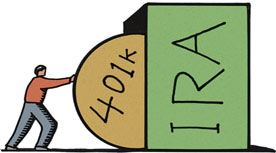
If you’ve experienced a job loss, switched employers, or retired recently, chances are you’ve heard from more than one financial advisor about rolling over your 401k to an IRA. You may have even been contacted by a representative of the 401k company asking if you want to rollover the account to an IRA within that same company. Unfortunately, you probably haven’t been provided all the facts from these individuals to know what the right decision is for YOU. Here are some of the facts you should consider:
Does your 401k provider charge a “maintenance fee” for you to keep your account where it’s at? Or if you decide to rollover into an IRA, does the IRA provider charge a maintenance fee? There are IRA custodians out there (e.g., TD Ameritrade) that don’t charge you a fee to hold an account with them. You should avoid paying any type of fee to maintain your old 401k or rollover IRA.
What are the expense ratios of the investment choices inside of your 401k? Exchange Traded Funds (ETFs) and mutual funds have built-in costs called expense ratios. You don’t pay out-of-pocket for these expenses, but it does come out of the performance of each fund that you are invested in, thereby reducing your account balance. This is the fee that the manager of the fund is paid. ETF’s typically have much lower costs than mutual funds because they track an index; they don’t incur the high overhead costs (such as research/management fees) that an actively-managed mutual fund incurs. Many 401k plans offer funds with high expense ratios. However, depending on the investments that you, or your advisor, choose inside of a rollover IRA, you could experience the same problem. My preference is to utilize ETFs that have expense ratios much lower than the industry average.
How good are the investment choices inside of your 401k? In other words, are you forced to pick from 15-20 funds that are offered inside of the 401k, regardless of their quality? Some 401ks offer a “self-directed brokerage option” which allows you to pick from thousands of different funds. The brokerage option would be one reason for you to keep your old 401k where it’s at, though you most likely will need guidance from a trusted advisor as to which funds you should invest in since there are so many to choose from.
If you rollover your 401k into an IRA, and utilize an investment advisor, what fees and/or commissions will the advisor charge you? The performance of your investments can become irrelevant if the fees/commissions you are paying for the advice are higher than added value of the advice you’re receiving. Also, with all of the high quality no-load mutual funds and ETFs available today, there is no reason why an investor should invest in a mutual fund with a load (i.e., commission).
In summary, more often than not, it is in the investor’s best interest to rollover an old 401k to an IRA. However, I want everyone to be aware that it isn’t always an obvious decision. There are many factors that should be considered first.
Share the Wealth of Knowledge!
Please share this post with family, friends, or colleagues using the links below. We love being introduced!
If you aren’t sure whether your portfolio is positioned properly for the current market environment based on the amount of risk that you’re comfortable with, we always provide a FREE 2nd Opinion Portfolio Review and would be more than happy to discuss your financial planning goals with you – please click here to schedule your meeting, or give us a call at 913.402.6099.
John P. Chladek, MBA, CFP® is the President of Chladek Wealth Management, LLC, a fee-only financial planning and investment management firm specializing in helping families and couples who are not yet retired realize their financial goals. For more information, visit http://www.chladekwealth.com.